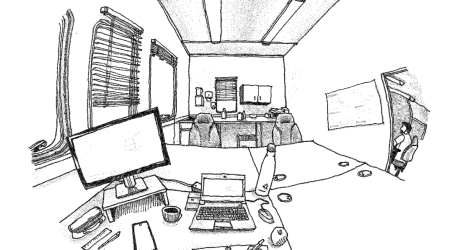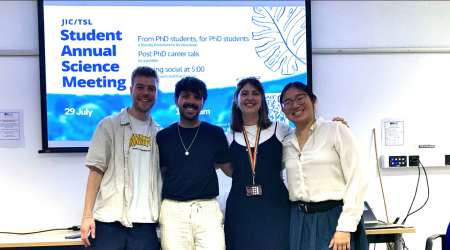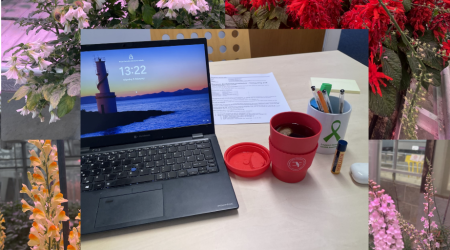Career Stories: Aston Saini, PIPS placement student – What I’ve learned about scientists engaging with policy makers

In today’s blog, we hear from Aston Saini, a ‘Professional Internships for PhD Students’ placement student who recently spent three months working within the John Innes Centre policy team.
Aston explores what his experience taught him about the ways researchers can engage with policy makers, as well as how crucial this aspect of science is in the modern age as we attempt to collaboratively tackle numerous global challenges. So, over to Aston.
“For many early-career researchers ‘science policy’ is an abstract concept. Some of us have a vague idea of what policy is, how it works, and what it’s for, but it had never really been clear to me.
Fortunately, after spending some time at the John Innes Centre working with the policy team, I’ve achieved a much better understanding of how policy works and how important it is.
As a bit of context, I am a plant science PhD student in my final year, working with chloroplasts. I love my work and adore research, but I have always been keen to investigate how I could translate scientific findings directly into helping people and making a significant change.
At this point in my career, I was already aware of spin-out companies and translational research projects but assumed that things like policy always involved working in a government role – in other words, abandoning your connection to science and trundling through reams of legislation.
That changed with the arrival of an email from my university department advertising a PIPS (Professional Internships for PhD Students) placement at the John Innes Centre.
After reading for only a few minutes, I was thoroughly excited. Being a plant scientist, I knew about the John Innes Centre and all the outstanding work they do with plant science, but I was totally unaware of the policy work taking place and its impact. The chance to gain first-hand, real-world experience in this area, which was not outside of, but integrated within science, seemed fascinating.
Not wanting to let the opportunity pass me by, I emailed back straight away and was delighted to be able to join the Strategic Engagement team at the John Innes Centre for my placement.”
Having spent three months here with us in Norwich, Aston reflects on what he learnt.
“My main takeaways from my time on the placement can best be described in the form of three distinct lessons. The first is that policy work at the John Innes Centre takes three key forms:
- The first is ‘policy advice’. Policy advice involves providing scientific evidence to inform the policy making process so that better informed decisions can be made. As the information is flowing from the scientists to the policy makers, we often call this ‘science for policy’.
- Next is ‘policy influence’. Here, the main aim is still to inform, but scientists or organisations might also advocate for specific science policy approaches. This is often to identify blockades for scientists conducting their research and recommend how to remove them. Since this usually relates to policy governing how research is funded or conducted, we call this ‘policy for science.’
- Finally, ‘policy intelligence’. This involves keeping up to date on the climate of both policy and science, so that organisations like the John Innes Centre can ensure its strategy and research meet future policy needs. As far as I know, this one doesn’t have a name yet, but if I were naming it, I’d call it ‘science and policy for the future’.”
Policy helps scientists, and scientists help policy
“My next takeaway is that the policy team at the John Innes Centre sits in a particular sweet spot, right between science and policy makers. By being embedded within the institute itself and having the rest of the Norwich Research Park next door, I found that accessing world-class scientists and their research was as easy as walking down a corridor and saying hello.
This benefits both the policy team and researchers. For the policy team, researchers are an invaluable source of information to inform their work, help inform policy makers and provide evidence for decision making. For the researchers, the policy team can open doors, and remove obstacles that they don’t have the time or tools to do themselves.
This relationship between policy and science at the institute is part of why it is so successful at both putting out world-leading research and influencing life changing policy all at once.”
Policy work changes lives
“The final lesson is that what is beautiful about policy is that your efforts have the capability to manifest and actualise change right in front of you. Like science, it does not always move fast – but when it moves, it has the power to change lives.
Originally, I was completely unaware of the importance or impact that policy work has. However, over the course of my placement, I have had a complete shift in perspective. Science and policy are not in fact distant at all; they are best friends. If you are a scientist interested in policy, get involved.
It could be as simple as speaking with the policy team at your institution or funder about the barriers you face in your research, or things you would like to see changed.
Even better, get directly involved! The John Innes Centre and many similar organisations are often looking to take on researchers for placements within their policy teams, and it is an invaluable opportunity to further bridge the gap, learn new skills and realise impact.”
We would like to thank Aston for all his enthusiasm and hard work whilst here on his PIPS placement. If you are interested in talking to him about his time working here, you can contact him via X (@Aston_Saini) or discord (_aston).



